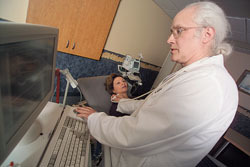
John Haefele of Unetixs Vascular demonstrates the North Kingstown company's vascular diagnostic machine on Martine Moscovita. The innovative machines combine two kinds of imaging - ultrasounds and exams to look for vascular problems.
Diagnostic machines provide early detection of cardiovascular problems
Unetixs Vascular Inc.
President: Peter A. Moscovita
Type of Business: Designer and manufacturer of vascular diagnostic machines
Location: 115 Airport St., North Kingstown
Employees: 32 in Quonset facility and six technical directors across the country
Year Founded: 1988
Annual sales: WND
Deaths caused by strokes are on the rise, according to the American Stroke Association. In 2001, 164,000 Americans died from a stroke, up from 144,000 in 1990, making it the No. 1 cause of disability and the No. 3 killer in this country.
Unetixs Vascular Inc. of North Kingstown aims to change all that with vascular diagnostic machines that combine a peripheral test and ultrasound.
“We can tell years in advance whether someone is heading toward a stroke, heart attack, diabetes,” said Peter Moscovita, company president and one of the founders. “The biggest problem we have is cardiovascular disease.”
A former engineer for Boeing, Moscovita and two colleagues, John Haefele and Anthony Castillo started Unetixs in a basement. Moscovita said he used funding from his prior business ventures – developing infrared thermometers for chiropractors, and graphic recorders – to fund the company’s introduction to the medical technology field.
Unetixs has its diagnostic machines in teaching hospitals, medical schools and certified vascular clinics all over the world, 15 schools in the United States alone.
Rhode Island Hospital currently has three of the company’s MultiLab Series II machines. The company also makes a smaller, portable version, the MultiLab Series 2-CP, which weighs 18 pounds, for mobile labs. Both models are equipped to store 50,000 to 70,000 complete patient files.
Moscovita designs a new model every 200-300 machines, although the software is constantly being updated.
“We take the application, do our own software development, electronics design and production and I design the machines myself,” Moscovita said. “Outside of Rhode Island, Unetixs is viewed as one of the top companies in the country.”
Unetixs is the only vascular diagnostic company on the East Coast.
The MultiLab machine combines two kinds of imaging – a physiological exam, which can look for vascular problems from head to toe, and an ultrasound, once the at-risk or problem area has been identified. Technical directors trained and employed by Unetixs travel to the country’s medical schools and hospitals to train technicians and doctors on the use of the machines. With cutting-edge technology developed by Unetixs, the technical staff can set up each machine’s diagnostics according to the procedures of that hospital or clinic. Other diagnostic machines can only perform ultrasounds or peripheral exams, not both, and are programmed to function one way. And the touch-screen technology makes the machines easier to navigate. Large machines can range in price from $70,000 to more than $100,000 and the portable units are about $22,000.
“We do the ultrasound and physiological testing to assess if there is a problem, and from there we can determine hemodynamically if someone is at risk,” Moscovita said. “Usually it takes two machines. For example, if a patient has soreness in the legs and redness, we do the pre-assessment to determine if the patient is at risk. Then without moving the patient or going to another machine or causing any discomfort, we go right to the ultrasound. What usually takes an hour and a half we can do in 15 minutes.”
Administrators and other medical professionals also travel to the Unetixs headquarters in Quonset Point for demonstrations taught by the company, complete with a book and DVD series for C.M. E. credits that Moscovita developed. To operate the machine, medical professionals must be certified vascular technologists, although that hasn’t been mandated yet in Rhode Island, he said.
MultiLab machines are used in clinics and hospitals for vascular surgery – they must use the technology to validate stent surgery before and after, Moscovita said – and by vascular, radiology and catheter labs in hospitals. Cardiology applications, which are becoming increasingly common, offer an entirely new field for Unetixs, Moscovita said.
The company is growing so fast, in fact, that Unetixs had to relocate from its 8,400-square-foot facility on Post Road to the larger facility in Quonset. And after the planned expansion to be complete this summer, the company will have a 20,000-square-foot manufacturing, software development and sales facility.












